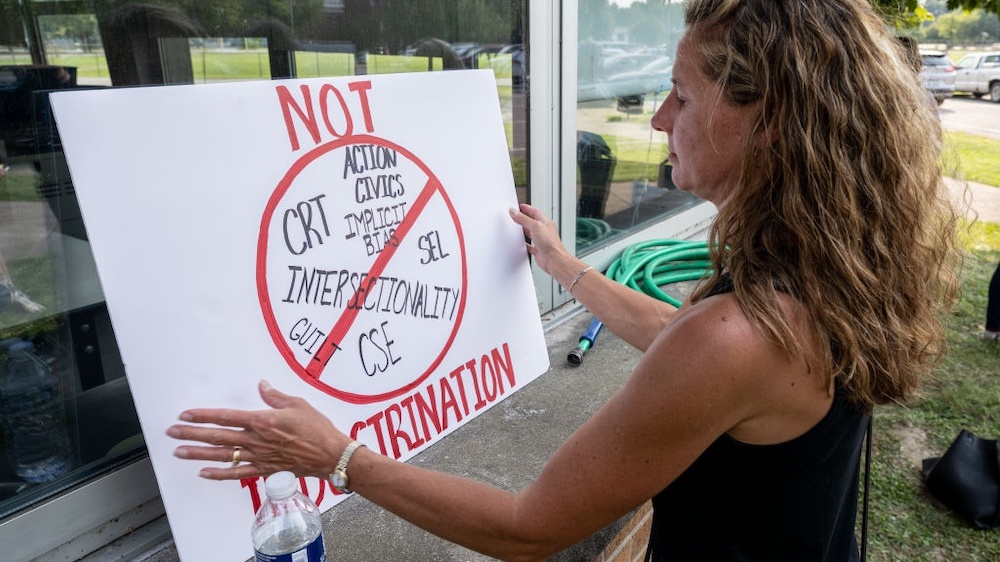If you’re interested in sharing your opinion on any cultural, political or personal topic, create an account here and check out our how-to post to learn more.
Opinions are the writer’s own and not those of Blavity's.
____
I recently received an email from someone who disagreed with a presentation I had given on the racist history of our national anthem, “The Star-Spangled Banner.” She expressed deep disappointment that I was “making everything about racism.” She assured me the anthem was not, in fact, racist and explained that white Americans were actually fighting against slavery: their own. She argued that the British wanted to impose slavery on white Americans through taxes.
She, like many Americans, was so confident in the version of history she assumed to know that she could not see the factual, moral and ethical hypocrisy of trying to equate a war over maritime trade restrictions, with the brutality and subhuman treatment of colonial and constitutional Americans inflicted on enslaved Africans for almost 200 years by 1812. It seemed ironic when she expressed regret that I and my Who We Are Project colleagues were “low information.”
She was right on one accord. There is indeed a problem with “low information” about American history. What I have learned in the last decade giving many presentations on the history of anti-Black racism in America is this: most Americans don’t know our true history.
In 2017, the Southern Poverty Law Center did a survey of high school seniors, social studies teachers and history textbooks. They found that only one in four students could correctly identify how provisions in the Constitution gave advantages to slaveholders. Two-thirds of the students do not know that it took a constitutional amendment to formally end slavery, and only 8% of them could identify slavery as the central cause of the Civil War. Most Americans hadn’t heard of the Tulsa Massacre until recently, and still, the majority haven’t heard of similar events in Wilmington, Elaine, Colfax, Memphis and Pulaski.
Orwell warned us — who controls the past controls the future. Without knowing our true history, Americans can fool ourselves into believing everything from egregious lies — such as the notion that enslaved people were treated like family (as one man featured in the Who We Are documentary suggests) — to subtler ones, like we live in a post-racial society because a Black man was elected as president.
Without knowing our true history, many Americans wrongly conclude that there are no systemic reasons for the racial disparities that exist in everything from education, to wealth, to infant mortality, to criminal justice outcomes. Without knowing our true history, we cannot understand how that history impacts our policies, institutions, and practices. As a result, we may (and do) wrongly blame those most oppressed by them. Worse still, this ignorance of our history leaves us open to continuing to perpetuate more harm.
Giving presentations on anti-Black racism over the past decade has also taught me something about the sound and fury over Critical Race Theory (CRT). I have yet to see CRT characterized accurately by anyone protesting it. It is a graduate-level curriculum that no elementary or secondary student includes in the classroom. So, why are teachers, parents and politicians protesting teaching it in schools? In this context, CRT is a decoy — the real goal is to prevent basic truths about our history from being taught. And they are succeeding. In 22 states, Republicans have proposed legislation to limit what educators can teach related to this country’s racist history.
What might Republicans’ vision of our history look like? Look no further than Trump’s Advisory 1776 Commission and its product, The 1776 Report, with its declared purpose to “enable a rising generation to understand the history and principles of the founding of the United States in 1776…” and explanation that “This requires a restoration of American education, which can only be grounded on a history of those principles that is accurate, honest, unifying, inspiring and ennobling.”
What if the accurate and honest history is neither unifying, inspiring nor ennobling? The report emphasizes that James Madison objected to the word “slave” because it was “wrong to admit in the Constitution the idea that there could be property in men.” Yet, the Constitution included at least five articles granting protection and advantage to slaveholders. Madison assured the founders that enslaved people wouldn’t be emancipated, writing “there is no power to warrant it [emancipation] in that paper [the constitution]. If there be, I know it not.” Madison knew that there could and would be “property in men” under our Constitution. The Trump solution: Teach the incomplete and misleading “facts” to keep things unifying, inspiring and ennobling.
If we want to ensure that young Americans do nothing to address racial injustice, then don’t teach them the truth about how we got to where we are. Because when people learn our true history, they are empowered to act. Knowing the truth and understanding the problem motivates people to be a part of the solution.
____
Jeffery Robinson is the Executive Director of The Who We Are Project and the former Director of the American Civil Liberties Union’s Trone Center for Justice and Equality.
